
|
|
|
| Marque | Norton |
| Model | Model 77 |
| Year | 1957 (1958 season) |
| cc | 600 |
| Engine | 4 stroke over head valve twin |
| Starting | Kick |
| Gears | 4 (foot) |
| Top speed | 80-90mph? |



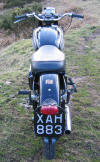
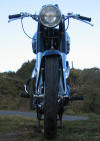
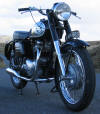


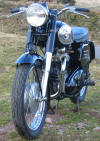




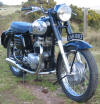
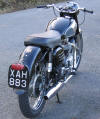

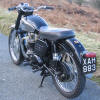
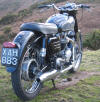


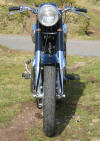
Road Manners
This Norton is very easy going and has generally good manners. The motor is willing and the ride is very comfortable with good brakes.
Build History
I acquired the bike around 1980 from a friend who had bought it with a 1958 model 50. It was a tatty runner. I tidied it up and ran it as my daily 'go to work' bike.
Since then, I have spent countless thousands on this bike! These thousands have been spent in the following way...
1983/4 : It had just about everything non cosmetic done. The engine has been sleeved down to standard and the big ends are on -20 thou. The valves and guides are new as are all bearings and seals. Ditto the gearbox, clutch plates, brake linings. It's not that any of these things really needed doing but in preparation for a world trip I wanted the innards to be as good as new. During the ride to Pakistan the engine was treated very gently. (A modern K&N air filter was used in the desert and the bores are very good)
2002 : This was mostly a cosmetic and running gear rebuild. I did take the head and barrels off but they were good. The paint is a very deep shiny professionally sprayed '2 'pack black. The front mudguard paint has since been scratched on the top but the rest is still very smart. The wheels were rebuilt and the tyres are new. The magneto has since been rewound (Xmas 2005). Fasteners are mostly stainless.
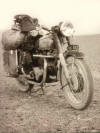
Journey To Pakistan - 1984
This article appeared on the www.realclassic.co.uk website in 2004 and is an account of the journey this actual Norton made from London to Pakistan.
What's a Norton Dominator 77? They hardly ever mention them in the
classic press. Try asking somebody and they'll probably tell you that
you've got it wrong and that it's actually a 7 because there's no such
thing as a 77. Bollocks! This 77 was made in 1958 and has similar cycle
wear to an ES2 of the same year with an engine that is the same as a
Dominator 99. So it's a swinging arm pre-featherbed 600 twin. You could
say that it's an honest gentleman's bike with zero pretensions and a
competent behaviour. It cost me £300 back in about 1980 and was a
slightly sorry looking runner. It got me to work at the music shop in
Harrow each day and at eighteen years old I was thankfully through the
'falling off often' stage. Earning just £28 a week, I paid for it in
instalments.
Back at the sillier age of 17, I had read Ted Simon's 'Jupiter's
Travels' and was mightily impressed. I was going to have a go at that,
and my half-formed brain conjured up images of riding a chopper through
India or Mexico with me as Clint Eastwood. As the brain evolved
slightly, I became interested in 'normal' bikes and decided that the
Norton would do the job of taking me around the world. With a new job at
a recording studio in Wembley I achieved a massive hike in earnings and
managed to pull in £50 a week plus overtime.
Somehow I managed to save several thousand pounds and rebuilt the bike
for the task ahead. Iran was gripped by religious fervour, Afghanistan
was full of Russians and 'Midnight Express' was a recent film. The
Iranian embassy granted me a 10 day transit visa and I was ready to quit
my job and hit the road.
May 1984: Five years of 'planning and preparation' and one Sunday
morning at the ripe age of 22, I was ready to leave suburban Hatch End
and head east on the new M25. I wasn't sure exactly where the M25 was,
but I found it. Somewhere near Potters Bar, I saw a 'mod' with a red
scooter and his girlfriend who were broken down, so I stopped to help.
When I got back on the Norton, the clutch wouldn't pull in. Five years
of 'planning and preparation' and I managed to get just ten miles down
the road!
This is the point where the trip really started.
I spent the evening under a lamp post outside the Dover youth hostel as
I didn't have the right spanner for the job. I rode the next morning
along the coast to Deal (for no particular reason) still clutchless and
stopped at a bus repair garage to ask it they could lend me a socket.
They told me of an old man called Jewis Oliver (or something similar)
who could help and that I could find him if I went 'down this lane and
into another and you'll know it when you see it…' I did, and knocked on
the door to be directed to the shed by his wife. He had a prewar BSA on
the bench and a back garden full of old cars.
The Norton's clutch pushrod had gone soft and needed hardening at one
end which he was glad to do. One hour later I was steaming out of Dover,
watching the white cliffs disappear.
Through Europe I went, sleeping in the woods or at campsites, with a few
minor adventures here and there. In Northern Yugoslavia (now called
Slovenia) I had my first puncture. It was very hot and up in the
mountains there were no facilities as such. Along came a farmer called
Karol who had fought with the British in the Second World War. With his
help we spent an hour or so (two attempts) fixing the hole, but I was
too late to get to a bank and it was Friday. In Yugoslavia you could not
even buy petrol without first buying petrol tokens. I had a hungry
weekend in Yugoslavia. They cook pigs on spits that you can smell for
miles and the hungrier you get the better they smell. I did manage to
get by with some small amounts of currency and headed south.
Titograd is the most depressing of the old-style communist cities
outside of Russia that I've ever seen, with its smoky cloak of dull grey
concrete factories and its sinister looking policemen. The road headed
inland through mountains and around lakes into a landscape that was
truly exotic. A speeding Mercedes came around the corner and threw up a
stone the size of a tennis ball. It missed my face (and dental
equipment) by inches.
Inches are the distance we are from oblivion at any given moment,
although we seldom realise it until things like this happen.
Kosovo looked very medieval and hour after hour I saw thousands of
smiling peasants wearing bright multi-coloured clothes and head scarves
in the fields who would stop working to wave to me as I went past. Now I
know what royalty feels like. I was waving for a couple of hours and my
arm went numb.
By the evening, I was in Greece.
Finding a campsite became an important task each day as the sun was
fading and one day, for some reason, I found myself completely off the
beaten track heading up a mountain track. By the time I had got down
again, it was very late. Throughout the day, I'd noticed that a tappet
had become noisy and had tightened it twice. Now it was chattering again
so I got out the torch (planning and preparation) -- and it fell into
pieces.
In the darkness, I somehow managed to fumble in my way into the pushrod
inspection cover. The pushrod cap was wobbly like a loose tooth. The
alloy rod had become soft and the cap was going to fall off sooner or
later. After midnight I found a campsite and fell into the sleeping bag
quite exhausted.
After a couple of days relaxing, I had the spanners out and saw that the
pushrod needed replacing, so walked to the railway station a couple of
miles down a country lane to board a train to Thessalonica. After
walking around for a couple of hours, I found an old man with a shop
full of bike parts which looked a lot like British ex-WD stock.
Everything in the shop was rusty and dusty and he had a couple of rusty,
dusty Triumph flat-tankers outside in the alleyway. How I found this
shop by walking around is a mystery.
He spoke no English but understood the problem. With a piece of steel
rod (probably from a tractor part), he led me through the streets to an
engineer who turned the rod to the same dimensions as the one from the
Norton and I had a new part. So long as I wasn't going to rev too high,
this would do.
Half way through Turkey there is an invisible line. One minute you're on
the outer fringes of the Western world and the next moment, you're over
the Sivas Pass and into a much wilder place. There were lots of
impoverished, suspicious, stone throwing Kurds, packs of wild dogs and
multicoloured mountains. Anything could happen here. There were no
campsites and I used small hotels and became acquainted with bed bugs
for the first time.
In the far Eastern end of Turkey at Dogubayazit, terror started to
infest my imagination with images of what was waiting for me in Iran.
The risk of torture, beatings and prison life were all on the menu for
an infidel such as myself. Iran was declaring war with the West on a
regular basis and, to make matters worse, I didn't have a customs carnet
to legally take the bike through.
One morning after a final cup of Turkish tea, I set off past Mount
Ararat and the resting place of Noah's Ark towards the Iranian border in
what might be my last hours of freedom.
There was a long line of trucks queued up at the border, and I was lucky
enough to meet an official to whom everyone bowed, and whose English was
very good. He asked me to write a letter promising not to sell the
Norton in Iran and said that he could issue me the correct paperwork! It
was lunchtime and I had still not been tortured. After going through
several offices I finally had a complete set of papers and stamps, so I
rode past the final checkpoint and into the setting sun still a free
man.
I couldn't believe my luck until I ran into an army patrol. They wanted
a 'souvenir' from my baggage, but then one of them smiled and said;
'Harley Davidson?'
'Yes' I said, and they sent me on my way unmolested (Norton 77
actually!).
Iran is a friendly place, where people offer travellers hospitality
whenever the chance comes. I was often bought food and taken to meet
relatives.
One day, I was having trouble finding a hotel and the owner of a car
showroom beckoned me into the showroom where I was promptly refreshed
with cups of tea and bowls of coconut ice cream. He handed me the phone
and said that it was for me! On the other end was his daughter in Tehran
who spoke good English and asked if there was anything they could do to
assist. I told her about the hotel problem and that I'd like to be able
to store the bike somewhere overnight. From that moment, the hotel that
was 'full' suddenly had a free room and I could leave the bike in the
showroom overnight.
Iran was like that.
Qom is the Islamic heartland of Shia Iran and was the only place that I
was not welcome. Having pulled up outside a hotel and taken off my
gloves and helmet, there was a very large crowd around the bike. I was
used to crowds, but these were different. The air was tense and hostile.
The hotel owner stood in the doorway and shook his head.
I put on my helmet and gloves and knew that I needed to get out as soon
as possible. As I fired up the engine, the crowd didn't part as crowds
usually did, they just stared. Clutch in, first gear, clutch slightly
out -- they reluctantly parted as I inched through them. I thought that
at any time, if someone had shouted anything riotous, that there'd be a
cosh around the back of the head and that it'd be all over. I got clear
as quickly as I could.
After an unpleasant encounter with a big crowd in Qom, I headed out of
town and then stopped for a coke. There were some young soldiers there
(who insisted on paying for my coke) who were comparing battle scars.
The war with Iraq was in mid-flight and a lot of them were being killed.
Later that day, the road surface changed under my wheels and I hit the
deck hard. The front lamp was smashed and my knee took the fall. A truck
stopped to help and I was on my way. The knee became stiff and painful.
It was my kickstart knee...
Fuel was not always easy to come by and there was a fuel stop every
200km in the desert with a long queue of cars waiting for the next
tanker delivery. The fuel supply was being interrupted by the war with
Iraq, but when I showed up, I'd be ushered to the front and anyone with
a spare litre would just bring it to me and tip it into my tank. I was
probably the only one who didn't have to queue for fuel. Before setting
off, they'd phone the next filling station to make sure that there was
fuel for me.
In the south of Iran, they were building a road as fast as they could.
The route through Kabul was closed due to the Russian invasion so the
old track through Baluchistan had become the new main route. I had
trouble leaving a town one day because I couldn't find the road. It was
then that I realised that there was no more road and that I'd be riding
on the desert track from then on. This was corrugated, hard-baked sand
which could be ridden slowly or fast -- but not in-between.
I fell off many times and would sometimes fall off every few minutes
when the sand became soft. This is one of the hottest places on earth in
August and I was wearing a black Belstaff jacket, sheepskin lined
leather boots and gloves, and a black helmet. If you take your gloves
off, your hands cook and if you take the rest off, you lose too much
moisture. Completely out of water one day, I ran into an army patrol who
offered the usual red carpet hospitality.
I finally arrived at the Pakistan border which is a few mud buildings in
the desert with a high fence that stretches for a few meters either side
of a gate. The words 's**t' and 'hole' come to mind. My first taste of
Pakistan was from a very creepy immigration officer who wanted to
interview all foreigners about 'sexual positions'.
The toilet was quite typically 'desert' and was a three-sided mud wall
structure with nothing inside but other people's poo turning to dust.
You do your business and stick the paper in the fresh poo. The swirling
wind then picks up the paper and sends it spiralling around your head
until it reached the top of the wall and disappears in to the desert! On
the subject of bodily functions, having a pee when riding was best done
on the bike and pointing to one side (wind depending) because there is
no firm ground in the desert to use the bike stand.
When sleeping in the desert, I'd wake up with sand in my mouth and ears.
My Belstaff pockets would be full of sand too, but the vastness of the
silence and the vista of the stars at night are unforgettable. The peace
and cleanliness that some desert veterans speak of are found here in
quantity.
The Bartholomew map shows a thick red line going through Baluchistan. On
a British map this would represent an A-road, but this was not even a
C-road. Maybe it's a Z-road because there was no road. There were many
tracks that could have been 'the road'. Keeping a sane head is the only
way to keep you in the right direction and panic is always a slip of the
brain away. To lose your way here is likely to be your last act.
Sometimes there was no sign of any other vehicles and I'd start to think
that I had strayed in the wrong direction, and then I'd see on the
horizon a dust trail thrown up by a distant truck and adjust my
trajectory a little.
My 'planning and preparation' had not extended to more than a litre of
water or any spare fuel, so some Iranians had given me a plastic jerry
can full of fuel. When I was getting low on fuel I stopped to fill up,
but the plastic had split and was just waving in the breeze. In these
situations (and there have been many) somebody of the 'bacon saving'
type often just turns up out of the blue (or they have done so far which
is how I'm still here). There was a small group of tents and I rode
towards them. The group chief was easy to spot. They always are in this
part of the world not just because they dress more regally but because
they hold a certain posture that singles them out.
I pointed at the tank and asked 'benzene?' He clicked his fingers and a
young boy ran off to return with a ceramic jar of benzene. They asked a
fair price for the fuel and I was on my way. This happened twice that
day. The desert was actually full of people in some areas although you
couldn't see them most of the time. These people were mostly Afghan
refugees or nomads. The 'road' had been bombed by the Russians on
occasion and the area was known as bandit country. I never knew if the
people who stopped me were bandits or not because they looked so
surprised to see me (in my Biggles outfit) that they offered me water
and cigarettes and forgot to rob me.
Weeks of travel through the desert had taken their toll. The jarring of
the corrugations of the 'road' had caused the oil in the forks to
disappear (I don't know where it went) and seize up, and the rear
swinging arm mounting holes had become elongated to give a sloppy back
end (nothing to do with poo).
I was still falling off quite often and it took all of my energy
sometimes to kick the bike off my leg to get free, and then lift the
bike up fully laden. I'd also not eaten much for several weeks and
looked like a war refugee myself, covered in filth and stinking like a
hog.
I met two English cyclists who were heading to Everest Base Camp from
Derbyshire. We tied a rope from the back of the Norton and I towed them
for a few miles across the desert until one of them caught my back wheel
and ended up in a heap. As I headed towards Quetta, the engine started
to misfire so I stopped and found that one of the magneto brushes had
fallen off its spring and only one cylinder was firing. No problem.
'Planning and preparation' meant that I had cunningly packed spare
brushes inside the headlamp - except that I'd forgotten to pack them!
It was a Homer Simpson moment.
There are so many times that I've been out on a bike and the engine
packs up. Typically it will be in the green lanes of Southern England
and I'll search around the kerbside until I find a bit of wire or string
or anything that will help me to limp the bike home. It's one of the
things that I like most about riding old bikes and it help to keep the
creative mind alive. In the Baluchistan desert, there is sand and there
are stones, but no 1950s Lucas magneto brushes that some earlier
traveller may have dropped.
Light bulb: I then remembered overhearing someone (deep in my
unconscious consciousness) say that these magnetos can run without the
earth brush. I did a swap and had a pair of cylinders running again.
Triumph! (Well, Norton 77, actually).
Quetta has an enduring background aroma of two-stroke exhaust and dusty
donkey poo which is punctuated by other, more astonishing smells. In
Quetta, I was greeted by Richard and Julie who were expecting me.
They'd heard that there was an English lunatic with a 1950s Norton en
route and we fast became friends. Emigrating from England to Australia,
they had ridden a similar route to me on a very shiny BMW RT100
spaceship which had been put on a train from Tehran to avoid the desert
section, and were getting ready for the ride to Delhi which we agreed to
do together.
Quetta was a surreal place for me and was my first time on the
subcontinent. The food passed through me so quickly that sometimes I
barely had time to pay the bill before running for the squat room. The
waiters were stoned most of the time and laughed when we placed an
order. Sometimes it came and sometimes not. They lived on the roof and
we gave them names like 'flock of birds' and 'dopey'.
We ate dahl, bindhi, boiled eggs with rice and flat bread mostly and for
a special treat everyday we'd go out for a mango lassi before taking a
long afternoon siesta during the hottest part of the day.
The BMW was in top condition and the Norton looked like it had come
through a bomb blast. Quetta was a good place to stop and gather
strength.
I shared a room with an Australian/Afghan truck driver who seemed to
have a wife or woman in every port and knew everything about smuggling
and war. He ran cargo from Germany to Pakistan, usually on a truck with
a smaller truck on the back which had a car on top, with every storage
space full of old TVs, fridges and any other cast-offs from Europe that
even the Poles didn't want. They all had value out here.
He would take back semi-precious stones that he'd buy from the Afghans.
He took us to dinner with the Mujahadeen fighters one evening: they'd
spend a couple of weeks fighting and then rest for a couple of weeks in
Quetta. The table was low and had a huge mound of rice in the middle and
a plate piled high with flat breads. Everyone put their hand into the
rice to pull off some meat from the mutton carcass that was hiding
inside. This is such a civilised way to eat.
Quetta became like home after a while. We knew a lot of people there and
became minor celebrities, but it was time to go so we headed out of town
one morning aiming to cross the Indus at Sukkur.
Slowly the landscape changed to low desert mountains and about an hour
out of town a truck came around a corner and into Richard's path.
At this point everything went into slow motion.
The fairing exploded into fragments as the BMW hit the side of the truck
and by the time I hit my brakes, I was sliding in the oil that had come
from the BMWs fractured engine.
I ended up still standing with the Norton on its side between my legs.
Richard and Julie were both lying on their backs by the side of the road
and the truck had stopped. There was a moment of timelessness that
seemed to hang in the air. We were still in slow motion. The truck
driver and his companions were looking at the mess and were looking at
me. There was some conferring. They probably didn't know the song
'Should I leave or should I go?' I can only guess that because it looked
like I would be able to pursue, that they stopped rather than driving
off.
Richard and Julie were mostly all right but their spaceship was broken.
The broken spaceship went on the back of the truck back to Quetta where
we spent another week or so. Richard endured his visit to the Quetta
hospital which he said was like an abattoir. They had run out of budget,
as they did every year two months after it arrived, and his knee was
sewn up with a needle from his sewing kit, which was better than the
hospital's remaining blood-encrusted needle.
One day we were invited to a Red Cross aid workers' party and saw how
the other half lives. We took two motor rickshaws (which look like
daleks) which ended up racing each other. At the bend where we crossed
the railway line the drivers were elbow to elbow and I could feel the
wheel lift for a moment. Behind the compound's high walls, there was a
sumptuous green grass lawn (with a swing), food to make your eyes pop
out of their sockets, fine wines and lots of posh white people. The
cultural shock was both pleasant and disconcerting at the same time.
When we left the gates, we were back in Pakistan. Everything was dusty
and beaten up.
Word had got through to Quetta that there was a Sikh uprising in
Amritsar, which was the only land crossing open between Pakistan and
India. I didn't immediately know it, but that was the end of the riding
for me too. Richard and Julie headed off (with broken spaceship) to
Karachi and I sent the Norton back to Hatch End via sea cargo. I carried
on using public transport and arrived back in the UK sixteen months
later. The BMW spaceship was made well in Sydney and then sold. The
Norton has been restored recently and is well again and now lives in
Combe Martin, Exmoor.
So the next time someone tells you that there is no such thing as a
Norton 77, you'll know otherwise.

Switzerland was quite snowy in the passes
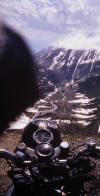
How not to take a picture!

Easy riding across Europe

The puncture in the North of Yugoslavia

Arrival at a Greek camping site with a sick pushrod.
My photographer friends told me that black and white photos were the business. That's why the switch to B&W.

The pushrod problem gets fixed

A Turkish or Iranian truck drivers stop.

The cyclists take a rest before attaching ropes to the Norton for a free pull.
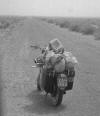
Baluchistan roads on one of the better sections where these was actually a road.

Looking a bit weather beaten.

Looking very tatty.
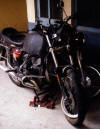
Richard and Julies BMW space ship Looking very defeated.
